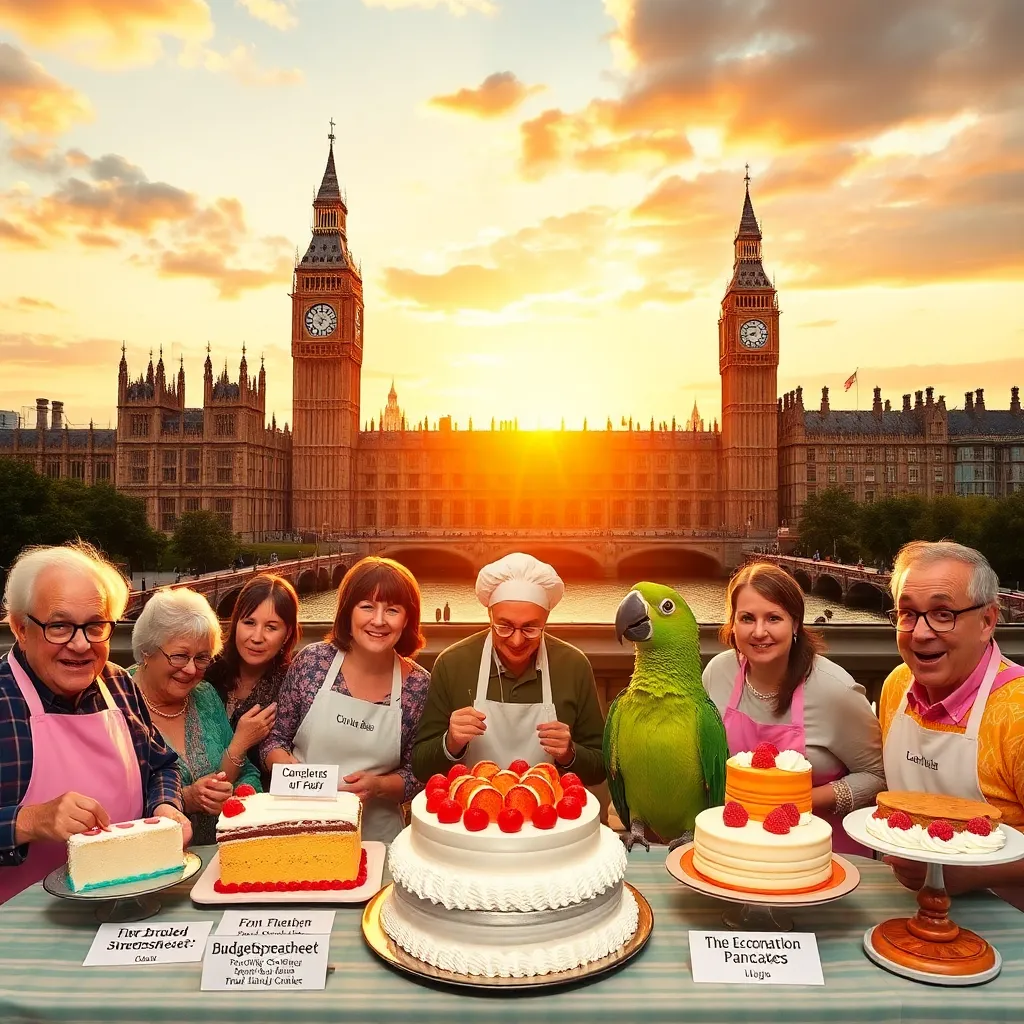The Great British Austerity Bake-Off
London, England - As the sun sets over the roof of Parliament, the tension in the air is thicker than the icing on a poorly baked cake. With the potential cost of staving off austerity looming over Britain like a dark cloud, it seems that the only thing the government can agree on is that they should all probably take a break. Enter the latest craze: The Great British Austerity Bake-Off, a competition designed to distract the public from economic woes while secretly hoping that baking can solve the nation’s financial crisis.
Flour Power: The Rise of Austerity Baking
In an unprecedented twist to the classic baking show, contestants are tasked with creating cakes that not only look good but can also double as financial statements. This unconventional challenge has seen bakers whipping up everything from “Pound Cake” to “Crumble and Save” in hopes of winning the coveted title of “Master Baker of Economic Recovery.”
“We thought, why not use baking to address austerity?” said a government spokesperson who preferred to remain anonymous, likely due to the sheer absurdity of the idea. “If we can’t fix the economy, at least we can have a good time trying!”
The Contestants: A Mix of Amateurs and Economists
Among the contestants are some unlikely characters. Meet Gerald, a retired banker turned amateur baker, who believes he can save the country with his famous “Inflation Flapjacks.” “They are full of oats and good intentions,” he claims, adding that a sprinkle of optimism is the secret ingredient.
Then there’s Sarah, a single mother of three from Liverpool, who is baking a cake shaped like a budget spreadsheet. “If I can bake my way through this competition, maybe I can also bake away my student debt,” she quips.
And let’s not forget about Tim, an economics professor who insists that his “Austerity Apple Crumble” is a metaphor for the state of the nation. “It’s all about layers,” he explains. “Just like our fiscal policies: flaky and prone to fall apart at any moment.”
The Judges: A Right Royal Mess
Judging the bake-off is a panel of distinguished figures, including a former Chancellor of the Exchequer, a celebrity chef, and, most curiously, a talking parrot named Sir Squawks-A-Lot. While the human judges critique the baked goods based on taste and creativity, Sir Squawks-A-Lot is there for comic relief and to occasionally squawk out economic jargon that no one really understands.
“This cake is a total disaster! It’s like the economy – looks good from afar but crumbles under pressure!” Sir Squawks-A-Lot squawks, earning both laughter and bewilderment from the audience.
The Austerity Cake: A Symbol of Hope?
As the show progresses, the contestants are challenged to incorporate modest ingredients that reflect the austerity measures being discussed in the nation. Flour substitutes, sugar rations, and even recycled egg cartons become staples in the kitchen. Contestants are encouraged to use their creativity to turn these limitations into culinary masterpieces.
“We’re all about sustainability here!” says one contestant, who has decided to bake a “Green Economy Pie” made entirely of leftover veggies. “It’s not just about saving money; it’s about saving the planet!”
Public Reaction: Is This Cake Even Good?
While the competition has garnered attention, public opinion is mixed. Some see it as a brilliant way to engage with the pressing issue of austerity, while others are scratching their heads at the notion that baking can solve economic problems. “I don’t think my mortgage can be paid with a Victoria sponge,” grumbled one Londoner while munching on a piece of cake that suspiciously resembled a tax form.
The Reality Check: Can Cake Save the Economy?
As the final episode approaches, economists across the nation are debating whether this bake-off is a viable solution to the nation’s problems or just a sweet distraction. Some argue that fostering creativity through baking could inspire innovative economic ideas, while others suggest it might just lead to more cake and less cash.
“At the end of the day, we need more than cake to fix our economy,” said one economist, shaking his head. “But if it gets people talking about it, then maybe it’s worth a try.”
Conclusion: A Slice of Hope?
As the contestants prepare for the final round, one thing is clear: whether or not cake can save the economy is up for debate, but it has certainly provided a platform for discussion. And in a country where austerity hangs over every decision like a heavy layer of icing, perhaps a little humor and creativity can go a long way.
So grab your aprons, bake your cakes, and remember: when the economy gets tough, the tough get baking! After all, who knows? The next great economic policy might just be hidden in a “Pie Chart.”
Will the Austerity Bake-Off Change Anything?
Stay tuned for the next episode, where the contestants will tackle the challenge of creating a cake that symbolizes unity in diversity. Will it be a success, or will it flop harder than a soufflé in a windstorm?
Only time will tell, but one thing’s for sure: in this bake-off, the only thing that’s rising faster than the dough is the nation’s hope for a better economic future.
